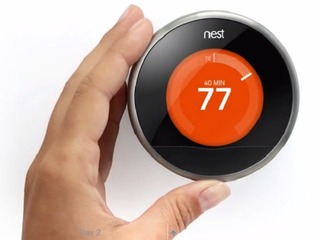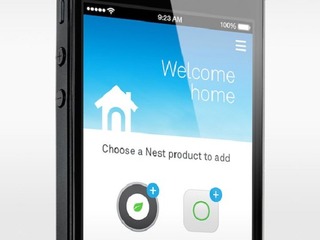
I find The Internet of Things to be one of the more interesting and exciting technology spaces out there. Maybe it is because I grew up watching The Jetsons, and I’ve been waiting to live in an automated home ever since.
Remember that thing that they owned where they would say whatever food they wanted and it would just make it for them? Yeah, I want one of those. Somebody really needs to figure out how to make that work.
The Internet of Things is not only an exciting space for consumers; it is attracting the attention of venture capitalists as well, who have begun pouring money into companies that not only create the devices, but also the software that make them work, as well as the platforms to help them run.
One of the most notable IoT companies is smart home thermostat maker Nest, which is now looking to raise a big new round of funding, according to a report from Re/Code, the new website from the team at the recently defunct AllThingsD.
The round will be at least $150 million and will apparently value the company at $2 billion.
Yuri Milner’s DST Global investment firm is said to be the leading investor in the round, with current investors including Google Ventures, Shasta Ventures, Kleiner Perkins, Generation Investment Management, Lightspeed Venture Partners, Venrock and others also participating.
Nest has already raised a significant amount of capital, including an $80 million round back in January of last year, with Google Ventures leading the round and Venrock participating. That lead to an $800 million valuation for the company, which will now apparently more than double.
A Nest spokesperson declined to comment on the report,
Nest was founded in 2010 by Tony Fadell, who is known as “the fathers of the iPod” for being the former Senior Vice President of the iPod Division at Apple.
The company became known for its smart thermostat, a small and simple tech device that learns user patterns and preferences to efficiently heat and cool their homes and help people save energy.
Nest has recently begun branching out beyond thermostats, debuting new carbon monoxide and smoke detectors, aka Nest Protect devices in October of last year.
Users are able to see the status of the batteries and sensors of every alarm. It will check a wired Protect device every half hour, and a battery-powered device every 24 hours, and of course, it will notify users when they need to change their batteries.
The Internet of Things
So what is The Internet of Things?
It is, essentially, a network of devices that are connected via sensors to maximize the potential of each object. And, while that may not sound all that exciting, it is when you hear some of the possibilities that can come from these sensors.
For example, you can have an alarm clock that is connected to your commuter train, which will ring early if there is a delay. Or you can buy a fork that will tell you how long it took to eat your meal and how many bites you took, to help you lose weight. Or you can buy a car that can drive itself.
This is a category that General Electric wrote could be worth $10 to 15 trillion by 2030. One that a survey from Zebra Technologies in October found was already in place in 15% of organizations around the world, and one that 53% of those organizations planned to implement within the next year. The possibilities for what can be achieved are pretty exciting.
Companies in the space are also starting to raise money. Zonoff, provides a software platform to its channel partners, who deliver “Connected Home” devices and services to consumers, raised $3.8 million.
This past November two IoT companies raised money: SmartThings, an open platform for the Internet of Things, raised $12.5 million in a Series A round of funding from Greylock Partners and Highland Capital Partners; while Arrayent, a provider of virtualization technology for the Internet of Things, raised $11.9 million in a Series B funding found led by DCM Ventures, with participation from Intel Capital.
Even Starbucks is getting in on the action, by saying it will double the number of Clover coffee-brewing machines it operates over the next year.
These coffee makers are connected to the cloud and allow stores to not only track customer preferences, but for recipes to be digitally updated and to allow employees to monitor how a coffee maker is performing. Starbucks has installed roughly 500 of the coffee makers since 2008.
(Image source: https://nest.com)


















